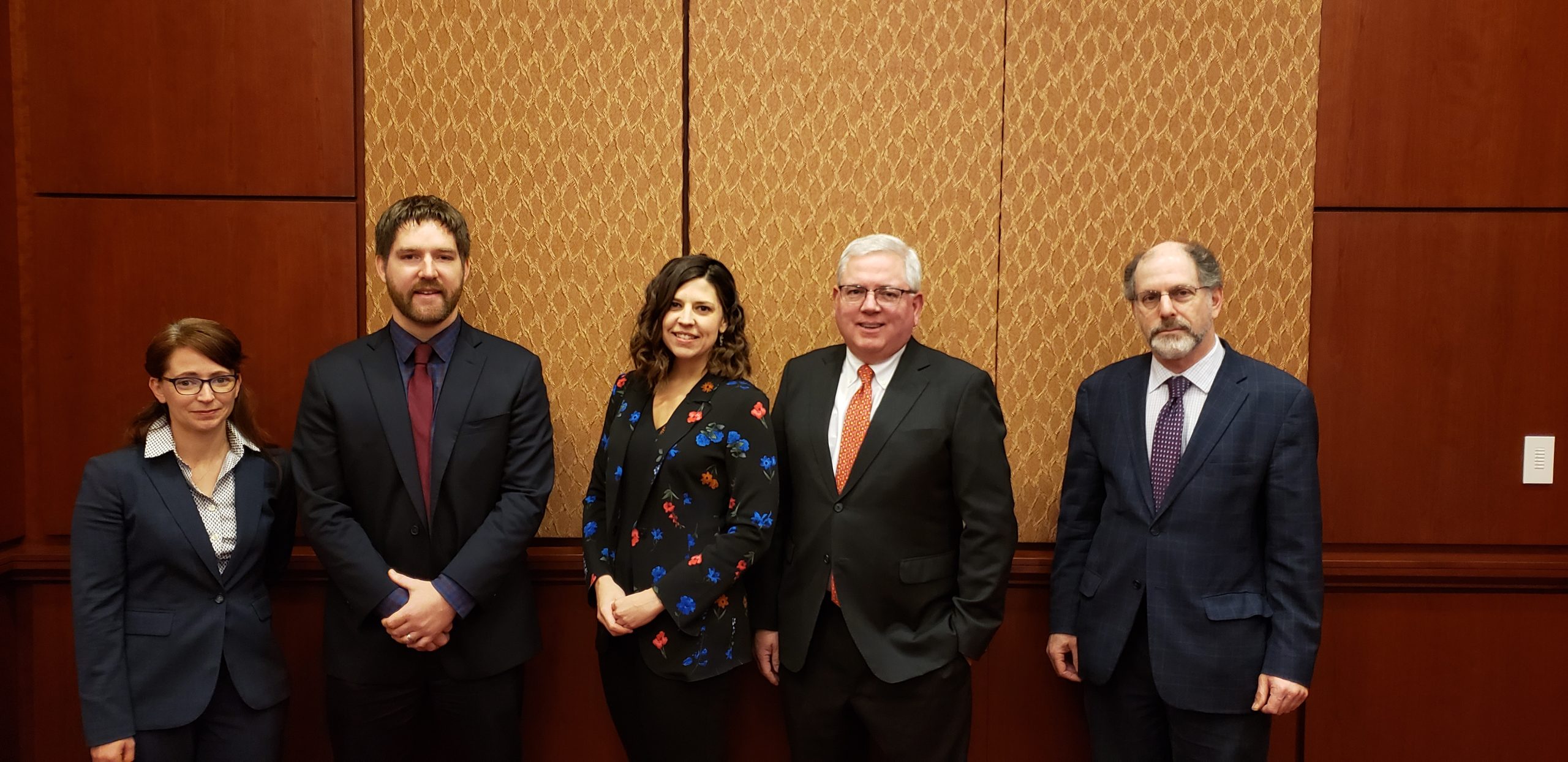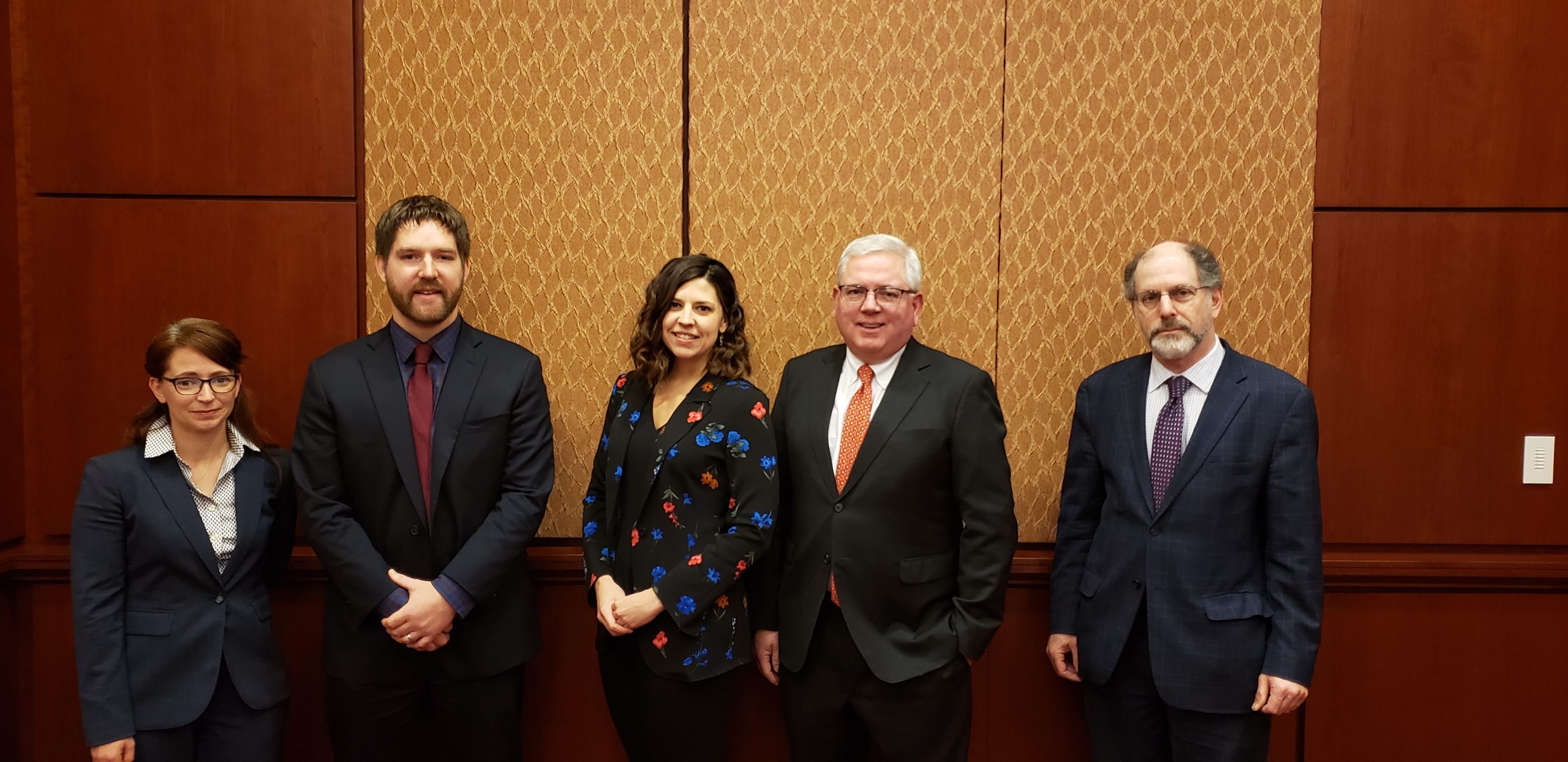Keystone Hosts Dialogue on the Fate of Nuclear Power in Carbon-Free Energy Future

Nuclear power provides over 50 percent of carbon-free energy in the United States. But as renewables and natural gas become increasingly cost-competitive and some policymakers push for a 100 percent renewable energy future, the fate of conventional nuclear and the existing nuclear power fleet is unclear. Scientists, policymakers, and energy analysts are debating the economics of nuclear energy and how nuclear policy should fit into a “carbon-free” energy future. With this backdrop, Keystone Policy Center partnered with Our Energy Policy to host a panel discussion Dec. 10 entitled The Fate of Nuclear Power: How Does Conventional Nuclear Power Fit into a Carbon-Free Energy Future?
Jessica Lovering, a fellow at the Energy for Growth Hub, moderated the discussion. Participants in the panel featured:
- Jackie Kempfer, policy advisor for Third Way’s Climate and Energy program.
- Edwin Lyman, acting director, Nuclear Safety Project, Union of Concern Scientists
- Jeffrey S. Merrifield, partner, Pillsbury, Winthrop, Shaw, Pittman LLP
- Devin Hartman, president & CEO, Electricity Consumers Resource Council
In the last decade, seven nuclear power plants have closed prematurely, and another 12 are scheduled to close in the next five years. These closures not only have significant impacts on local economies, but also on air quality and carbon emissions.
“Carbon-free nuclear energy is the foundation upon which clean energy growth is built, and that foundation is crumbling,” said Kempfer.
The panel discussed two pieces of legislation addressing nuclear energy and plants. S. 2368, the Nuclear Energy Renewal Act, was introduced by Sen. Chris Coons (D-Del.) and aims to improve the economic viability of existing nuclear power plants by investing $755 million annually in innovation across computing, advanced light-water reactors fuels, new materials and waste processes, and training programs for the future nuclear workforce. The Nuclear Power America Act, introduced in the Senate by Sens. Ben Cardin (D-Md.) and Kevin Cramer (R-N.D.), and in the House by Rep. Darin LaHood (R-Ill.), would make existing nuclear power plants eligible for a 30 percent investment tax credit.
The panelists also discussed balancing safety and regulation with Merrifield pointing out that nuclear plants are safer than they’ve ever been. Lyman agreed but stressed that safety and security should never be compromised in service of ensuring that the nuclear energy remains viable.
“We can’t compromise on nuclear safety and security because if we do, we sacrifice the reliability of that resource in the future,” said Lyman.
Determining whether nuclear power is economically viable was also examined by the panel. The answer is not so simple because factors vary so much across the country depending on state and regional policy and prices, plant size and capacity, and other factors. Similarly, compensating nuclear energy’s carbon benefits in the markets is difficult because patchwork state policies supporting nuclear and subsidies for other sources keep the market far from “pure.”
With this event featuring a timely, in-depth discussion, and strong audience attendance, Keystone will examine possibility of hosting future discussions on issues related to our work.
Note: Keystone Policy Center takes no position on nuclear power. It does not advocate for or against any particular energy policies. This discussion focused on conventional nuclear energy under the assumption that it will continue to be part of the nation’s resource mix so that panelists could focus on the nuances of the economics of conventional nuclear power, rather than debating the pros and cons of nuclear energy overall.


 Effective March 1, 2025, Thomas J. Vilsack, former United States Secretary of Agriculture and Governor of Iowa, became the first Chief Executive Officer for the World Food Prize Foundation. In this new role, Governor Vilsack is focusing on expanding the Foundation’s global network, and will further position the Foundation as a leader in addressing global food and nutrition insecurity, continuing his lifetime of public service.
Effective March 1, 2025, Thomas J. Vilsack, former United States Secretary of Agriculture and Governor of Iowa, became the first Chief Executive Officer for the World Food Prize Foundation. In this new role, Governor Vilsack is focusing on expanding the Foundation’s global network, and will further position the Foundation as a leader in addressing global food and nutrition insecurity, continuing his lifetime of public service. Shelby Coffey III is a distinguished journalist, media executive, and thought leader whose career has helped shape the landscape of American news and public discourse. Over several decades, Coffey has held some of the most influential roles in journalism, including serving as editor of the Los Angeles Times, executive vice president of ABC News, and deputy managing editor of The Washington Post. His editorial leadership extended to key roles as president of CNN Financial News, editor of the Dallas Times Herald, and U.S. News & World Report.
Shelby Coffey III is a distinguished journalist, media executive, and thought leader whose career has helped shape the landscape of American news and public discourse. Over several decades, Coffey has held some of the most influential roles in journalism, including serving as editor of the Los Angeles Times, executive vice president of ABC News, and deputy managing editor of The Washington Post. His editorial leadership extended to key roles as president of CNN Financial News, editor of the Dallas Times Herald, and U.S. News & World Report. Jerry Steiner has spent 40 years involved in agriculture following growing up on a Wisconsin dairy farm. He began his career with Monsanto, in multiple business leadership roles. From 2003-2013 he served as a member of the Executive team, as the company’s Executive Vice President of Sustainability and Corporate Affairs. He led the company’s global Government, Public and Industry Affairs teams across the 70 countries where Monsanto conducts business. This experience got Jerry connected to the Keystones centers work in agriculture. Key among his responsibilities were shaping the company’s public policy and building partnerships aimed at helping farmers around the world produce more food, while conserving valuable resources like water and energy. Two unique partnership that developed under his leadership were drought tolerant corn with 5 African countries, CIMMYT and the Gates foundation, and a building a sustainable business model in Brazil with the value chain leading to significant multi-company investment and soybean varieties that can protected themselves.
Jerry Steiner has spent 40 years involved in agriculture following growing up on a Wisconsin dairy farm. He began his career with Monsanto, in multiple business leadership roles. From 2003-2013 he served as a member of the Executive team, as the company’s Executive Vice President of Sustainability and Corporate Affairs. He led the company’s global Government, Public and Industry Affairs teams across the 70 countries where Monsanto conducts business. This experience got Jerry connected to the Keystones centers work in agriculture. Key among his responsibilities were shaping the company’s public policy and building partnerships aimed at helping farmers around the world produce more food, while conserving valuable resources like water and energy. Two unique partnership that developed under his leadership were drought tolerant corn with 5 African countries, CIMMYT and the Gates foundation, and a building a sustainable business model in Brazil with the value chain leading to significant multi-company investment and soybean varieties that can protected themselves. Jennifer Morris is the Chief Executive Officer of The Nature Conservancy, leading a team of nearly 6,000 staff working in more than 80 countries and territories tackling the dual crises of the
Jennifer Morris is the Chief Executive Officer of The Nature Conservancy, leading a team of nearly 6,000 staff working in more than 80 countries and territories tackling the dual crises of the  Congressman Joe Neguse represents Colorado’s 2nd District in the U.S. House of Representatives. He was elected to his first term in November 2018, becoming the first Black Member of Congress in Colorado history. In December 2022, Rep. Neguse was elected by his colleagues to serve as Chair of the Democratic Policy and Communications Committee (DPCC), becoming the first Coloradan to serve in a senior elected leadership role in the House in over 85 years. He serves on the Natural Resources and Judiciary Committees, and was also appointed by House Minority Leader Hakeem Jeffries to serve as one of four Democrats on the prestigious Rules Committee. Rep. Neguse serves as Ranking Member on the House Subcommittee on Federal Lands, which he previously Chaired in the 117th Congress.
Congressman Joe Neguse represents Colorado’s 2nd District in the U.S. House of Representatives. He was elected to his first term in November 2018, becoming the first Black Member of Congress in Colorado history. In December 2022, Rep. Neguse was elected by his colleagues to serve as Chair of the Democratic Policy and Communications Committee (DPCC), becoming the first Coloradan to serve in a senior elected leadership role in the House in over 85 years. He serves on the Natural Resources and Judiciary Committees, and was also appointed by House Minority Leader Hakeem Jeffries to serve as one of four Democrats on the prestigious Rules Committee. Rep. Neguse serves as Ranking Member on the House Subcommittee on Federal Lands, which he previously Chaired in the 117th Congress. Llewellyn King was born in Southern Rhodesia, now Zimbabwe. He went into journalism as soon as he turned 16, stringing for Time magazine and United Press in Africa.
Llewellyn King was born in Southern Rhodesia, now Zimbabwe. He went into journalism as soon as he turned 16, stringing for Time magazine and United Press in Africa. Steven Williams is the Chief Executive Officer of PepsiCo North America, overseeing a more than $48 billion business that spans PepsiCo’s Foods and Beverage operating units. His leadership encompasses more than 125,000 associates and over 900 locations across the U.S. and Canada. Steven joined PepsiCo in 2001 as part of PepsiCo’s acquisition of the Quaker Oats Company, which he joined in 1997, and has held leadership positions of increased responsibility since.
Steven Williams is the Chief Executive Officer of PepsiCo North America, overseeing a more than $48 billion business that spans PepsiCo’s Foods and Beverage operating units. His leadership encompasses more than 125,000 associates and over 900 locations across the U.S. and Canada. Steven joined PepsiCo in 2001 as part of PepsiCo’s acquisition of the Quaker Oats Company, which he joined in 1997, and has held leadership positions of increased responsibility since.